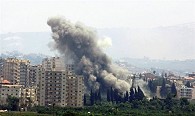2006年VOA标准英语-Olmert Tours Front-Line Areas, Consults With No(在线收听)
By Jim Teeple
Jerusalem
07 August 2006
 Lebanese civil defense rescuers carry body of a victim in Ghaziyeh, August 7, 2006 |
||
---------
Prime Minister Ehud Olmert toured front-line areas with senior defense officials, and held consultations with officers in the Northern Command, who are directing Israel's ground campaign in Lebanon.
Israeli Defense Minister Amir Peretz said Monday that Israel will expand its ground offensive soon, if diplomatic efforts to end the conflict fail to make progress.
Peretz says he has already given an order to the army to be ready for a major war, if negotiations to end the current fighting fail.
 Israeli air strike hits the area of al-Hosh, north of Tyre, Monday |
||
Israel has about 10,000 ground troops deployed in the fight against the militant group Hezbollah in Lebanon, but they have so far not been able to significantly deter Hezbollah rocket launches, which have increased in recent days.
President Bush says the U.S. and its allies will work in the U.N. Security Council to quickly approve a draft resolution calling for a cessation of hostilities in Lebanon. The draft allows Israel to respond, if attacked by Hezbollah militants and to keep its forces inside Lebanon, until a possible deployment of international peacekeepers.
Israeli Foreign Ministry spokesman Yigal Palmor says Israel believes only international peacekeepers can end the crisis.
"Lebanon cannot control Hezbollah. The central government is too weak," he said. "This is why they need to be assisted by the international community, not only in words, and in Security Council resolutions, but in facts, with deeds on the ground. That means an international military force that will deploy wherever it is needed in the south, or along the Lebanon-Syria border to assist the Lebanese army and the Lebanese police in enforcing law and order."
Lebanese leaders have so far said the U.N. plan is unacceptable, because it allows Israel to keep its forces inside their country, until the peacekeepers arrive. Lebanese leaders have asked that the U.N. demand that Israeli forces leave Lebanon immediately once a ceasefire takes effect.